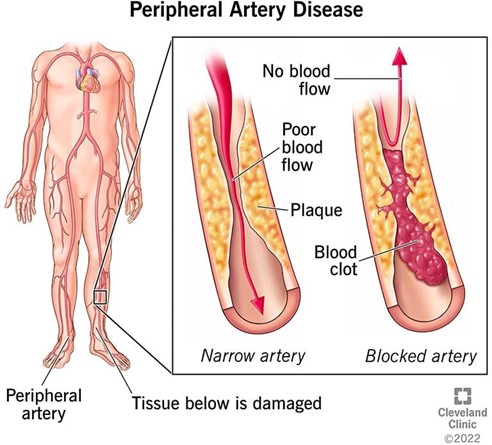A nurse is assessing a male client who has advanced peripheral artery disease (PAD). Which of the following findings should the nurse expect?
Thin, pliable toenails
Hairy legs
Leg pain at rest
Flushed, warm legs
The Correct Answer is C
feet or toes that occurs at night and is not relieved by rest.

Nursing Test Bank
Naxlex Comprehensive Predictor Exams
Related Questions
Correct Answer is B
Explanation
The P wave is the first wave on the ECG strip and represents the electrical activity of the atria. It reflects the depolarization of the atrial myocardium, which is the process of changing the electrical charge of the cardiac cells from negative to positive, triggering a contraction. The P wave precedes the QRS complex, which represents ventricular depolarization, and the T wave, which represents ventricular repolarization.
The other options are not correct because:
a. Slow repolarization of ventricular Purkinje fibers. This statement is incorrect because it describes the U wave, which is a small and sometimes invisible wave that follows the T wave on the ECG strip. It reflects the repolarization of the ventricular Purkinje fibers, which are specialized cardiac cells that conduct electrical impulses to the ventricles. The U wave is more prominent in conditions that cause hypokalemia, such as diuretic use or vomiting.
c. Early ventricular repolarization. This statement is incorrect because it describes the ST segment, which is the flat line between the QRS complex and the T wave on the ECG strip. It reflects the early phase of ventricular repolarization, which is the process of restoring the electrical charge of the cardiac cells to negative after a contraction. The ST segment can be elevated or depressed in conditions that cause myocardial ischemia or injury, such as angina or myocardial infarction.
d. Ventricular depolarization. This statement is incorrect because it describes the QRS complex, which is the largest and most visible wave on the ECG strip. It reflects the depolarization of the ventricular myocardium, which triggers a ventricular contraction. The QRS complex follows the P wave and precedes the T wave on the ECG strip.
Correct Answer is A
Explanation
The nurse should explain that cardiac enzyme studies measure the levels of certain enzymes, such as troponin, creatine kinase, and lactate dehydrogenase, that are released into the bloodstream when the heart muscle is damaged by an MI. These tests help determine the degree of damage to the heart tissues, as well as the timing and severity of the MI.
"These tests will enable the provider to determine the heart structure and mobility of the heart valves." is wrong because cardiac enzyme studies do not provide information about the heart structure and mobility of the heart valves. Other tests, such as echocardiography or cardiac catheterization, may be used for this purpose.
"Cardiac enzymes will identify the location of the MI." is wrong because cardiac enzyme studies do not indicate the specific location of the MI within the heart. Other tests, such as electrocardiography or coronary angiography, may be used for this purpose.
"Cardiac enzymes assist in diagnosing the presence of pulmonary congestion." is wrong because cardiac enzyme studies do not directly assess the presence of pulmonary congestion, which is a complication of heart failure. Other signs and symptoms, such as dyspnea, crackles, and chest x-ray findings, may be used for this purpose.
Whether you are a student looking to ace your exams or a practicing nurse seeking to enhance your expertise , our nursing education contents will empower you with the confidence and competence to make a difference in the lives of patients and become a respected leader in the healthcare field.
Visit Naxlex, invest in your future and unlock endless possibilities with our unparalleled nursing education contents today
Report Wrong Answer on the Current Question
Do you disagree with the answer? If yes, what is your expected answer? Explain.
Kindly be descriptive with the issue you are facing.
